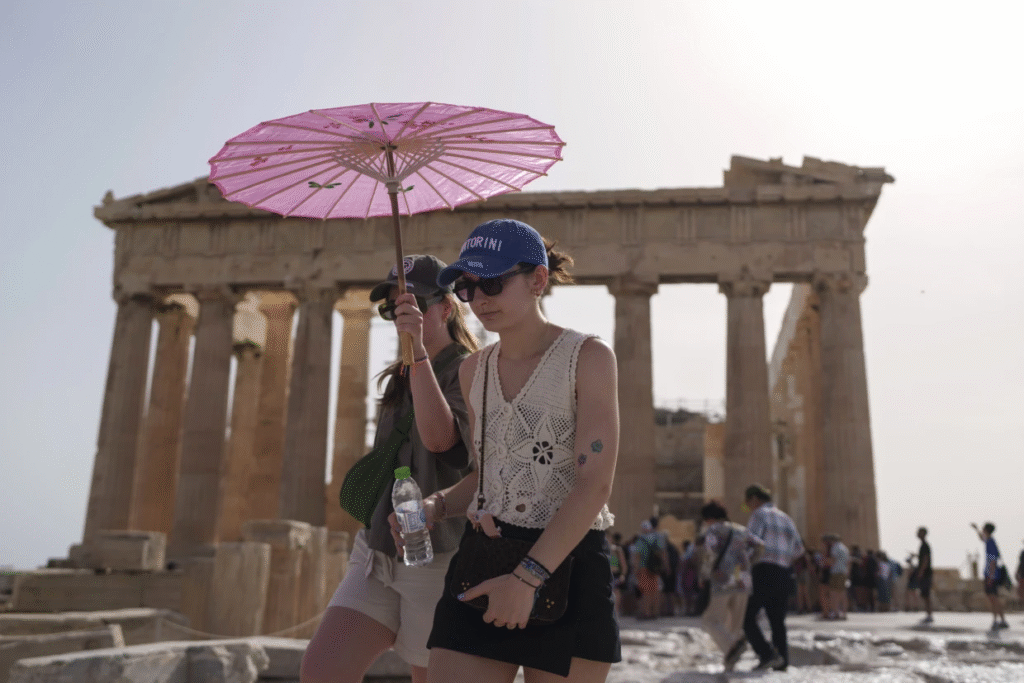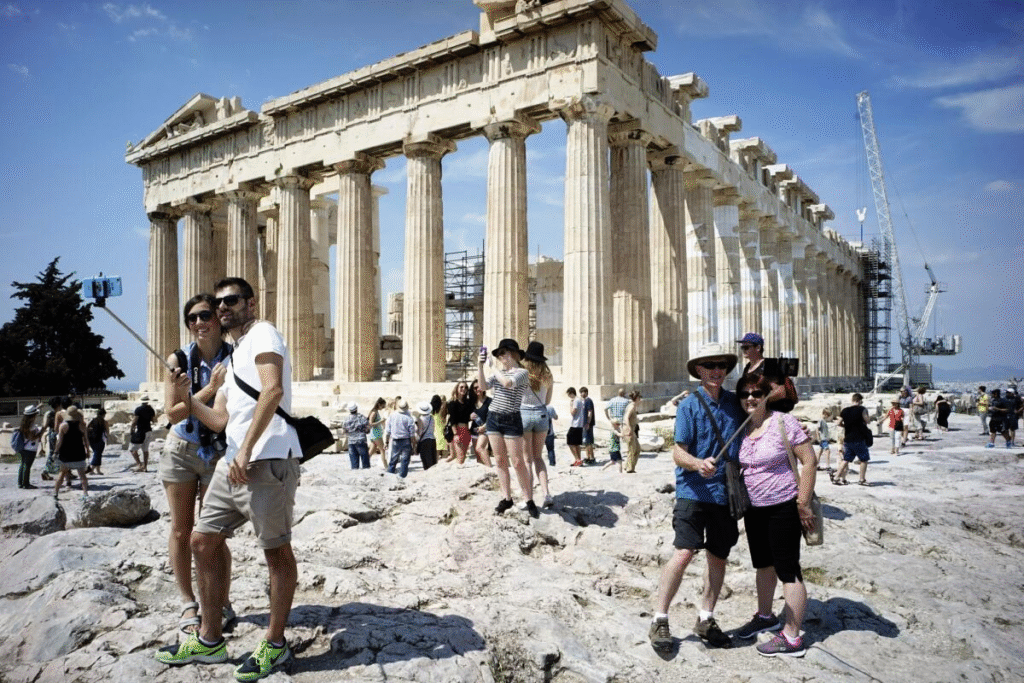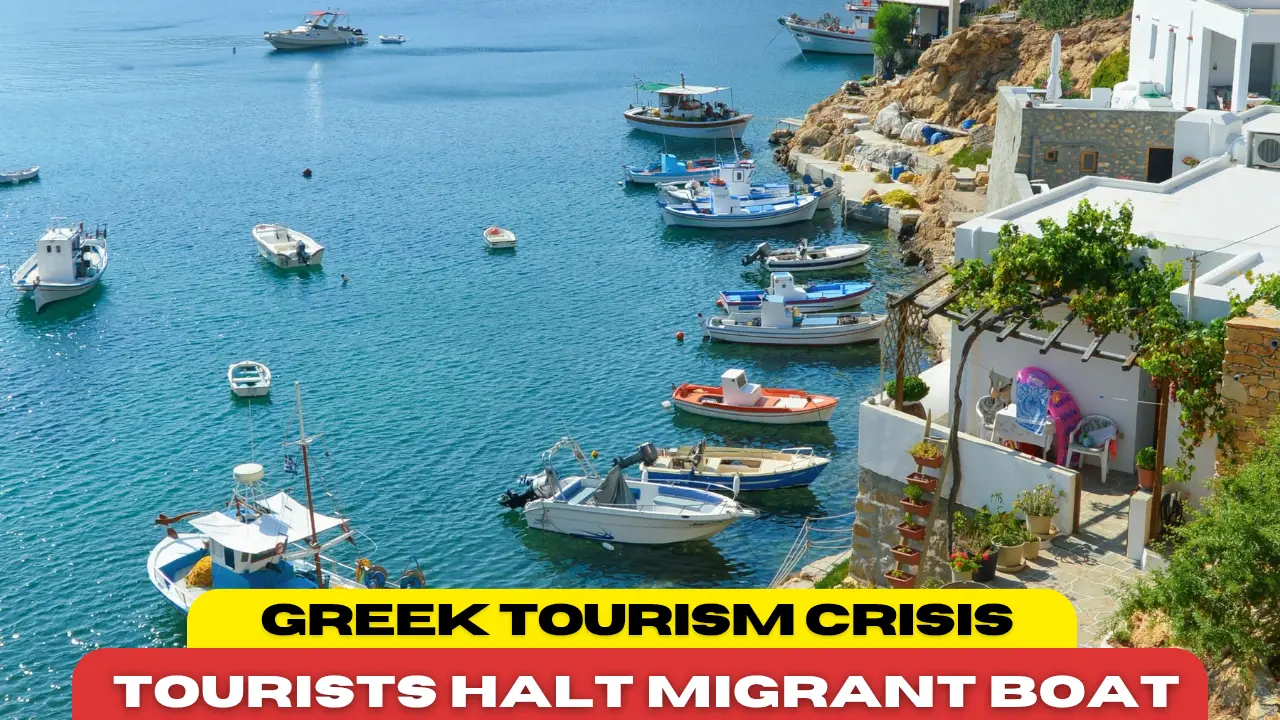Greece, a nation synonymous with sun-drenched beaches, ancient history, and vibrant culture, is grappling with an unprecedented challenge. The ongoing migration crisis, once a concern primarily for the government and aid organizations, has now spilled onto the very shores that attract millions of tourists each year.
A recent incident, where tourists on a popular beach in the southern Greek islands became frontline actors in a high-stakes standoff, has thrust the Greek tourism crisis into the global spotlight.
This daring, high-tech showdown, which saw vacationers using jet skis, drones, and even their own bodies to halt a crammed migrant boat Greece, has sparked a fierce debate about the intersection of tourism, humanitarianism, and national security.
The Unfolding Scene: A High-Tech, High-Stakes Standoff
The incident unfolded on a remote beach on the island of Gavdos, known for its pristine waters and secluded coves. On a seemingly ordinary day, a small, overcrowded vessel was spotted approaching the shore. Unlike previous encounters where authorities were the first to respond, this time, a group of holidaymakers took matters into their own hands.

Using personal drones, they tracked the vessel’s approach, broadcasting the live feed to other beachgoers. Several individuals, some on jet skis and others swimming, formed a human chain, physically pushing the boat back from the shoreline. The scene was a chaotic mix of frantic shouts, whirring drones, and the rhythmic splashing of water. According to a report by The National Herald, the migrants were later redirected to a nearby port, away from the escalating tension.
This event highlighted a new and dangerous dimension to the Greek tourism crisis: a shift from passive observation to active, and sometimes hostile, intervention by civilians.
Why This Isn’t Just a One-Off Incident
This event, while dramatic, is not an isolated case. It’s a symptom of a larger, systemic problem. The number of irregular migrant arrivals on Greece’s eastern and southern borders has been on the rise.
According to the International Organization for Migration (IOM), over 10,000 people arrived in Greece by sea in the first quarter of 2025, with a significant number coming from Egypt, Libya, and other North African nations.
Also Read: World Tourism Day: Date, History, Quotes, Celebration and Messages
This surge in arrivals is straining resources and creating flashpoints in areas popular with tourists. The constant flow of a migrant boat Greece is becoming a familiar, and increasingly tense, sight.
The rise of civilian intervention can be attributed to several factors:
- Perceived Government Inaction: Many locals and tourists feel that official responses are too slow or ineffective, leading them to take what they see as necessary measures.
- Economic Fears: There is a growing fear that the migrant crisis could damage the tourism industry, the lifeblood of the Greek economy. With tourism revenues rising by 11% in the first half of 2025 (Bank of Greece), any disruption is a major threat.
- Technological Empowerment: The proliferation of personal technology, from drones to social media, has given individuals the tools to monitor and document events in real-time, creating a new form of citizen-led response.
The Unintended Consequences of a Daring Showdown

While the tourists’ actions were seen as “daring” by some, they have created a complex ethical and legal quagmire. The incident has raised serious questions about:
- Safety and Legality: Is it safe or legal for civilians to confront migrant boat Greece? The potential for violence, injury, and a fatal outcome is high.
- The Humanitarian Perspective: What are the moral implications of pushing back a boat of vulnerable people? This action runs contrary to the principles of search and rescue at sea.
- Damage to Greece’s Image: The incident, broadcast globally, risks tarnishing Greece’s reputation as a welcoming, hospitable destination, further fueling the Greek tourism crisis.
This volatile mix of tourism and migration is a stark reminder that the serene facade of a holiday destination can hide a much more difficult reality.
The Path Forward: Balancing Hospitality and Security
So, what’s the solution? Navigating this complex issue requires a multi-pronged approach that addresses both the immediate crisis and its long-term impacts on the Greek tourism crisis.

Here are some critical steps that need to be taken:
- Enhanced Official Presence: The Greek government and EU agencies like Frontex must increase their patrols and response times in popular tourist areas to ensure that professionals, not civilians, are handling these situations.
- Public Awareness Campaigns: Tourists and locals need to be educated on the legal and ethical dangers of intervening with a migrant boat Greece. A campaign could highlight the proper protocol for reporting a distressed vessel and the risks of taking action.
- Strategic Investment: Funds should be channeled into new, humane migrant reception centers on less populated islands or mainland locations to de-stress the tourist hotspots.
- International Cooperation: The crisis can’t be solved by Greece alone. Deeper cooperation with countries of origin and transit, particularly Egypt and Libya, is essential to address the root causes of migration.
The showdown in Gavdos is a wake-up call. It highlights the urgent need for a cohesive strategy that protects human lives, preserves Greece’s vital tourism industry, and maintains law and order on its beautiful shores.
A Turning Point for Greek Tourism
The recent Greek tourism crisis, characterized by a daring standoff between tourists and a migrant boat, is a pivotal moment for a nation heavily dependent on its travel industry. The high-tech, high-stakes scene on a pristine beach serves as a powerful metaphor for a country caught between its economic interests and a humanitarian crisis. The actions of the tourists, while controversial, underscore a growing frustration and a desperate desire to protect a way of life.
The future of Greek tourism hinges on its ability to find a sustainable and compassionate balance. It is a challenge that requires more than just government policy; it demands a global conversation about shared responsibility and human dignity.














